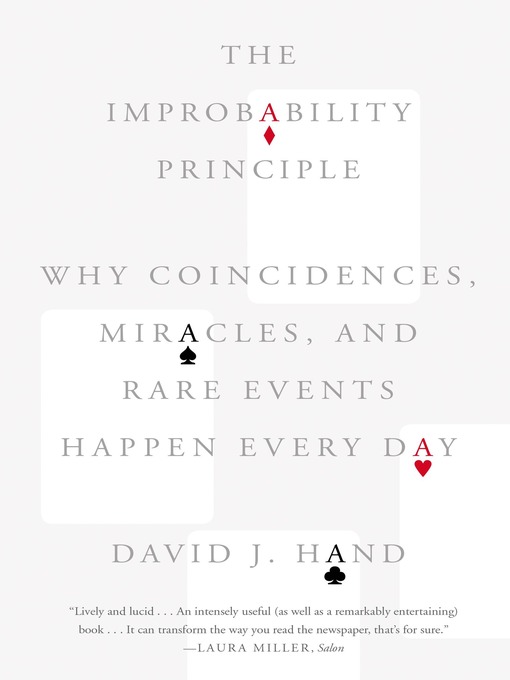
The Improbability Principle
Why Coincidences, Miracles, and Rare Events Happen Every Day
کتاب های مرتبط
- اطلاعات
- نقد و بررسی
- دیدگاه کاربران
نقد و بررسی

December 2, 2013
Winning the lottery or being struck by lightning is rare but not impossible, so when it happens repeatedly to the same individual, it seems miraculous. Not so, writes Hand, emeritus professor of mathematics at Imperial College, London (Statistics: A Very Short Introduction), in this ingenious introduction to probability that mixes counterintuitive anecdotes with easily digestible doses of statistics. Thus, through the “law of truly large numbers,” he reveals that, among the billions of events we experience throughout our lives, outrageous ones are bound to occur. Meanwhile, the “law of selection” reveals how probabilities can be made to appear artificially high due to selecting criteria after an event. In other words, it generates miracles from otherwise routine events. And everyone has nightmares ending in disaster: historians have marveled at Lincoln’s pre-assassination dream. Similarly, according to pyramidologists, combining dimensions of the Great Pyramid of Giza produces amazing predictions or coded messages; the pyramid itself is huge and irregular, giving the examiner leeway in choosing the numbers. But it’s the “law of near-enough” that guarantees such spectacular connections. Hand offers much food for thought, and readers willing to handle some simple mathematics will find this a delightful addition to the “why people believe weird things” genre.

February 1, 2014
Enlightening and entertaining explanation of why extraordinary events are to be expected. Former Royal Statistical Society president Hand (Emeritus, Mathematics/Imperial Coll., London; Statistics: A Very Short Introduction, 2008, etc.) is an erudite but utterly unpretentious guide to the often confusing and counterintuitive subject of probability and its underappreciated complement, improbability. He explains why we should not be surprised, for example, when some people win lotteries or are hit by lightning multiple times, despite the odds against either event happening to any single person even once being vanishingly small. Chapter by chapter, Hand pieces together the threads of what he calls the "Improbability Principle," showing that if something can happen, given enough time and enough opportunities (according to the law of very large numbers), it will happen. But he also reveals that extraordinary events which, in theory, are highly improbable or even impossible, usually prove, upon closer inspection, to have "probability levers" that raise the odds they will happen: Roy Sullivan was struck seven times by lightning, which would seem fantastical if you didn't know he was a forest ranger. "The Improbability Principle tells us that events which we regard as highly improbable occur because we got things wrong," writes Hand. "If we can find out where we went wrong, then the improbable will become probable." Without taxing casual readers with strenuous math, the author coolly examines many fascinating examples of the unlikely, including odd coincidences--as when actor Anthony Hopkins found a copy of the book his next film project was to be based on in an empty seat on a subway train and learned weeks later that the copy belonged to a friend of the book's author who was preparing an American edition--hot streaks in sports, ESP research, C.G. Jung's accounts of synchronicity, and even the origins of life and the universe. Ably and assuredly demystifies an ordinarily intimidating subject.
COPYRIGHT(2014) Kirkus Reviews, ALL RIGHTS RESERVED.

March 1, 2014
We frequently hear about extremely unlikely occurrences: someone wins a lottery twice, or gets hit by lightening thrice, or has a dream that uncannily predicts a future event. We think these instances are so unlikely that we want to attribute them to supernatural causes. But such things happen often enough that there should be other explanations. Hand (mathematics, Imperial Coll., London; Information Generation: How Data Rules Our World) provides explanations in this clear exposition. He uses actual examples to show why many strange events are really more likely than one would expect, while other cases are the result of deception (conscious or unconscious) based upon post-event selection (i.e., interpretation after the fact). Hand shows how the mind can equate matters that are in fact not the same or can misremember details. He also provides a short philosophical diversion into cosmology and evolution and a quick lesson in how statistics are used and misused in research. VERDICT This entertaining and illuminating book, explaining a lot with a minimum of mathematical alphabet soup, is recommended to all interested general readers.--Harold D. Shane, mathematics, emeritus, Baruch Coll., CUNY
Copyright 2014 Library Journal, LLC Used with permission.

January 1, 2014
Multiple lottery wins. Unexpected financial meltdowns. Lightning striking the same person several times. These events, while astounding, are nonetheless to be expected, as mathematics professor Hand capably explains in this well-plotted book. The principle hinges on the idea that seemingly improbable events, from the individual to the cosmic level, are commonplace due to several factors. Academic but not dry, the concepts are presented in a relevant way and at a good clip, with some eye-catching examples. Hand notes the counterintuitive nature of certain aspects of probability, as well as the history of how understanding in the field has developed. A touch of levity goes a long way toward making the subject engaging. As Hand shows, probabilities are also about peoplewhat we view as remarkable and why. Far from being disillusioning or removing the magic from these events, the elegant framework beneath marvelous events is something worth marveling at in itself. For those interested in an understanding of the principles of probability, this account is sure to be an odds-on favorite, even for those without much background in the subject.(Reprinted with permission of Booklist, copyright 2014, American Library Association.)

























دیدگاه کاربران